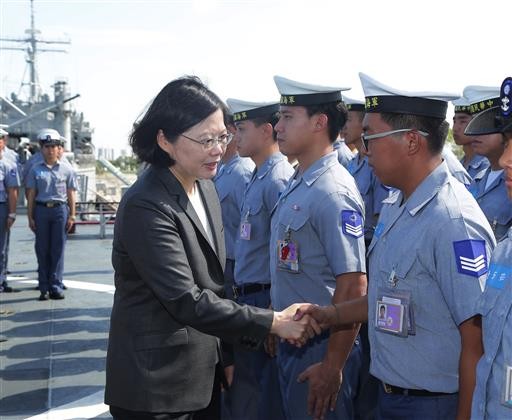Popular Reads
Top Results
Can't find what you're looking for?
View all search resultsPopular Reads
Top Results
Can't find what you're looking for?
View all search resultsTaiwan president apologizes to aboriginals for suffering
Change text size
Gift Premium Articles
to Anyone
T
aiwan's president has apologized on behalf of the government to the island's aboriginal peoples for 400 years of conquest and colonization.
Tsai Ing-wen said Monday it was necessary for the government to face up to past injustices in order for Taiwan to move ahead as a fair and equitable society.
Taiwan was inhabited by a variety of tribes for thousands of years before Dutch colonizers began importing Chinese laborers in the 17th century.
Tsai was elected by a landslide in January elections that have thrown a shadow over the island's relations with China, which claims Taiwan as a part of its territory from ancient times. Her view of Taiwan as a colonial society clashes with Beijing's claim that the island has always been an inherent part of China.
On Sunday, hundreds of aboriginal activists gathered in Taipei's main thoroughfare Ketagalan Boulevard to voice their demands for concrete measures to redress the historical injustices the indigenous groups have suffered and to restore the aboriginal cultures.
The peaceful protests took place in the boulevard, which was renamed 20 years ago in honor of the Ketagalan tribe, one of Taiwan's many tribes.
Tsai, the first Taiwanese leader with aboriginal blood, will also outline Monday her policies concerning the country's indigenous people. Tsai's paternal grandmother was from the Paiwan indigenous tribe.
Last month, her Democratic Progressive Party (DPP) promised to pass the Aboriginal Basic Act which will, among other things, grant greater self-rule autonomy to the indigenous communities, protect their languages and safeguard their land and sea rights.
Many are also calling for aborigines to be covered under the so-called transitional justice legislation that has been launched by the DPP to redress political persecution from 1949 to 1990.
Under the martial law period from 1949 to 1987, aborigines were forced to adopt Chinese names.
Aboriginal legislator Kao Chin Su-mei, one of six aboriginal lawmakers in Taiwan's 113-seat Parliament, told The Straits Times that it remains to be seen if Tsai will keep her promises, especially one on the return of ancestral lands.
"We always hear a lot of talk about engaging the aboriginal community and helping us. But it seems to be political rhetoric because there has been little positive impact on our lives. Let's hope it's different this time round."
Pan Chih-hua, one of 300 members of the Aboriginal Alliance for Transitional Justice, marched 450 km from Taiwan's south-western town of Hengchun to take part in the protest at Ketagalan Boulevard. He said: "Apologizing is just a start...We hope the government will follow up with real actions to restore our dignity and give us the respect we deserve."
Chang Tien-ming, who heads the Indigenous People's Autonomy Alliance, said: "We want peace and are not seeking independence. We also want to be treated fairly rather than be seen as outcasts."










